As a B2B marketer, you probably already understand the basics of content marketing. You know it’s about creating valuable, relevant content that builds trust and nurtures relationships — but now you need to sell its importance to the rest of your company. Or, maybe you’re still on the fence, wondering if content marketing really is the right strategy to drive growth and generate leads in your business.
Data is, of course, the measure of business success. Wherever you stand on content marketing, knowing and using the most salient statistics should drive your strategy — and likely prove your case about its importance.
To set you up for success in 2025, we’ve gathered some of the most essential stats around content marketing effectiveness, success, growth, ROI, B2B, B2C, lead generation, and more. They also reveal emerging trends including the increasing use of video, the rise of AI tools for content creation and personalization, and the shift toward thought leadership content.
These insights will help you stay ahead of the curve and align your content strategy with what’s working for B2B and B2C marketers alike.
Top Content Marketing Statistics 2025
Looking for a quick overview? These statistics highlight where content marketing is headed and how other top marketers are leveraging it to achieve such goals as brand awareness and lead generation:
- Nearly half of the marketers say their content marketing budget will increase in 2025; 8% say it’s going to decrease, and 41% say it’s going to stay the same.
- The top areas where B2B marketers expect to see an increased investment in 2025 are videos (61%) and thought leadership content (52%)
- Video has been voted the most-often-created type of content for marketing for four consecutive years.
- Only 29% of marketers whose organizations have a documented content strategy say it’s extremely or very effective. Another 58% say it’s moderately effective.
- The top goals that B2B marketers achieved this year by using content marketing include creating brand awareness (87%), generating demand/leads (74%), and nurturing subscribers/audiences/leads (62%).
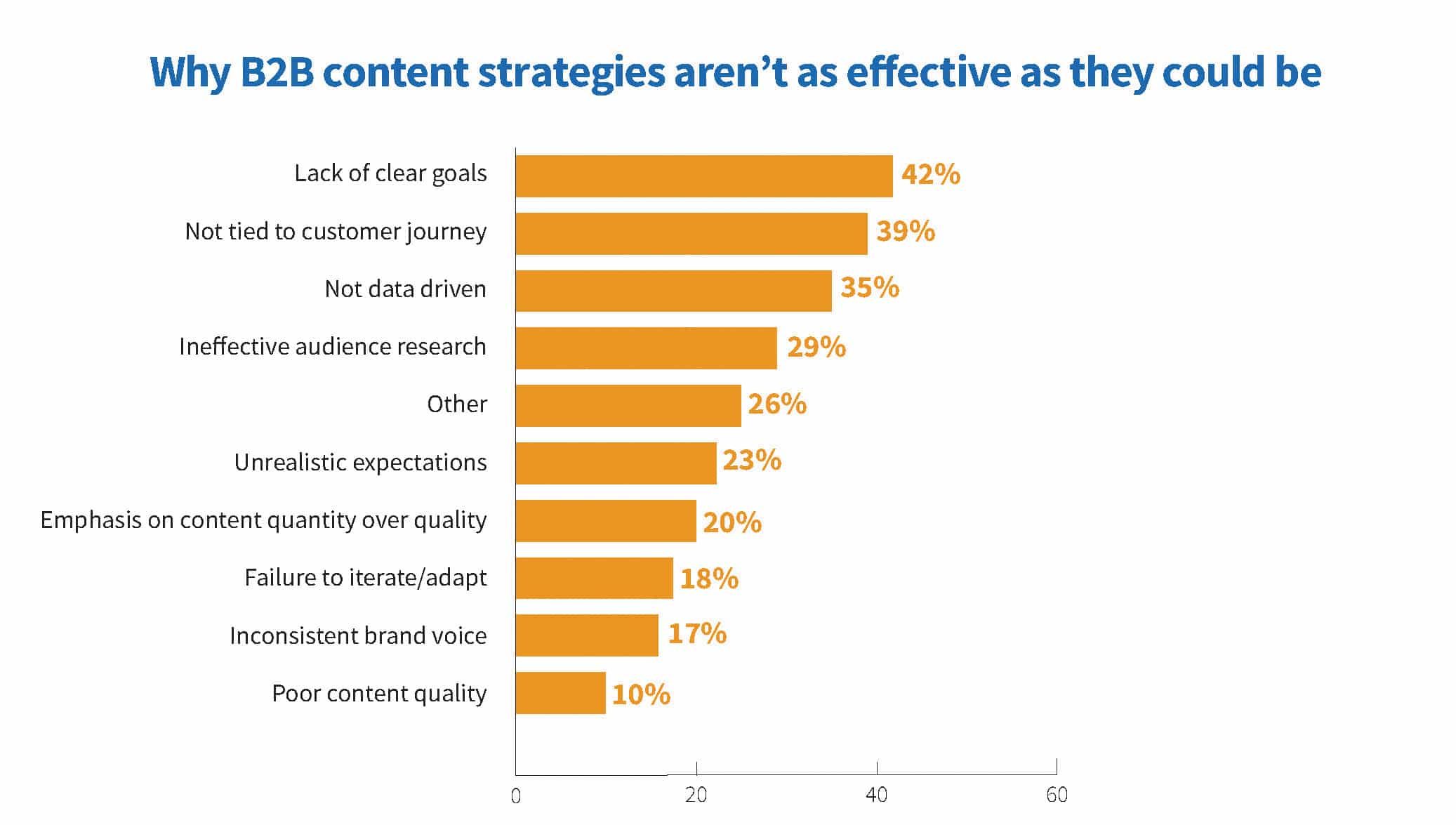
B2B Content Marketing Statistics
B2B marketers rely heavily on content marketing, and the data backs up its importance. From short articles to video and case studies, the most effective strategies can drive powerful results. Social media platforms including LinkedIn dominate as the top distribution channel, proving how critical it is for you to tailor content for the right audience.
Here’s what else you should know:
- 92% of B2B marketers use short articles/posts, 76% use videos, and 75% use case studies/customer stories for their content marketing.
- Content marketing is a part of 97% of B2B marketers’ marketing strategies, according to Oren Greenberg of Kurve.
- The most effective distribution channels for B2B marketers in 2024 were social media platforms (90%), blogs (79%), email newsletters (73%), email (66%), in-person events (56%), and webinars (56%).
- 84% of B2B marketers say that LinkedIn delivers the best value — followed by Facebook (29%) and YouTube (22%).
- Knowing how to do it right is key: 28% of B2B marketers report that their organization is extremely or very successful with content marketing; 57% rate their success as “moderate.”
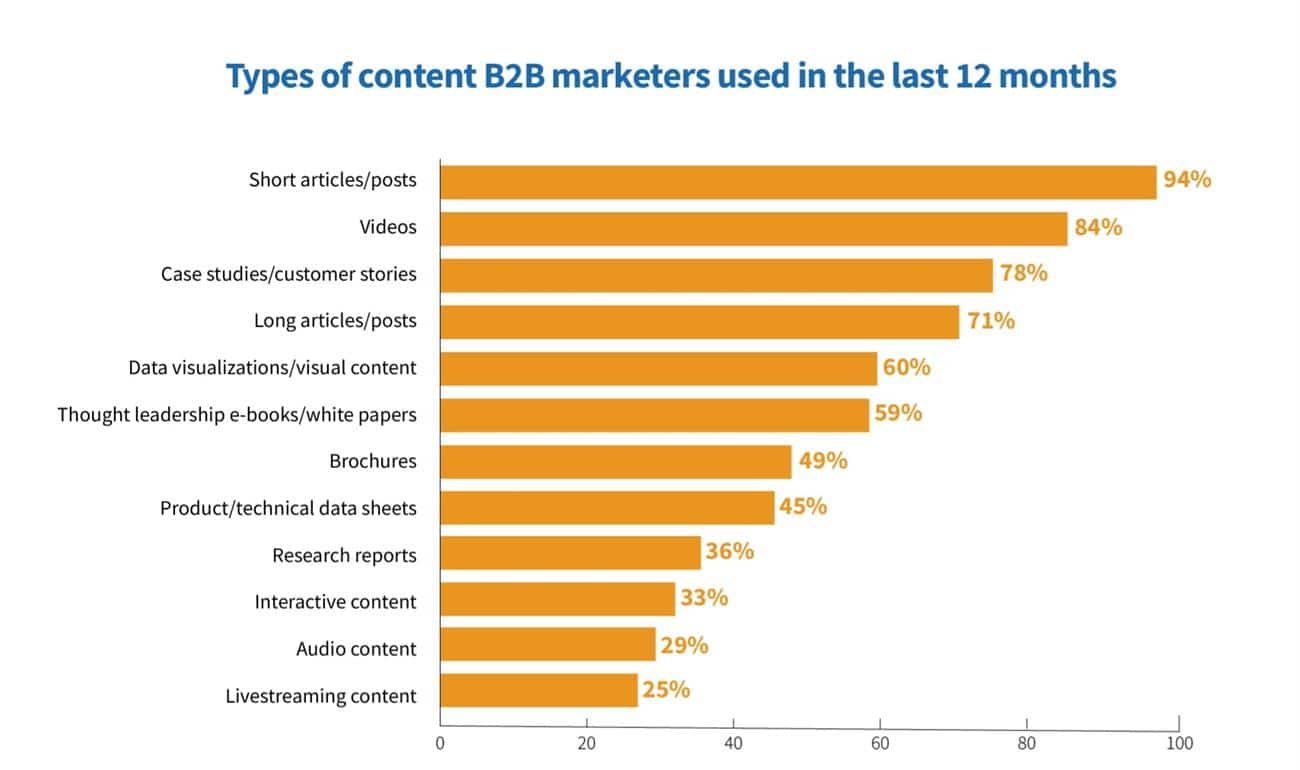
[Source: Marketing Profs.com]
B2C Content Marketing Statistics
Content marketing isn’t just for B2B — it’s a core part of many B2C strategies, too. With marketers using video, in-person events, and short articles to deliver impactful results, content marketing is a meaningful way to connect directly with your audience.
Here’s a look at how and why content marketing works for B2C (the data is less recent than for B2B, but do show useful trends):
- 24% of B2C marketers spend 10% to 24% of their total marketing budget on content marketing. The next highest categories were 25% to 49% of that budget (17%), 50% to 74% (17%), and 5% to 9% (16%).
- As shown below, 29% of B2C marketers report that their organization is extremely or very successful with content marketing: for moderately, it’s 52%.
- 71% of B2C marketers have used videos in the last 12 months.
- In-person events (48%), short articles/posts (47%), and videos (45%) produced the best results for B2C marketers.
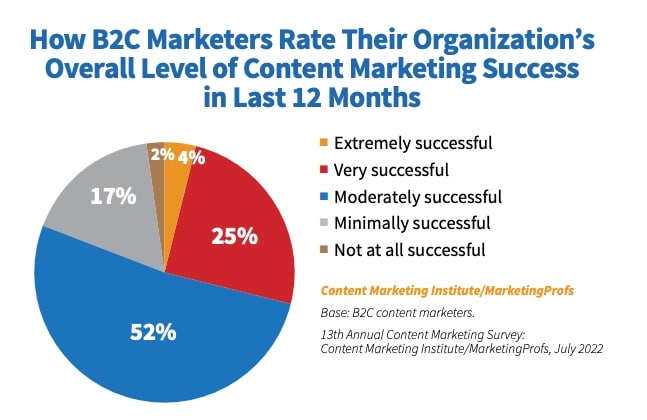
[Source: Content Marketing Institute)]
Content Marketing ROI Statistics
Content marketing ROI data helps you think through where and how to spend funds on content marketing for the biggest impact.
Here’s how some of the numbers are shaking out:
- The top marketing channels with the biggest ROI are websites/blogs/SEO (16%) and social media shopping tools such as Instagram Shops (16%), followed by paid social media content (14%), email marketing (14%), and content marketing (14%).
- For every $1 spent, email marketing generates $36 in ROI.
- 63% and 43% of marketers respectively say that social media and email drive the highest ROI of all marketing channels.
- 93% of video marketers reported that video gives them a positive ROI.
- 67% of marketers say that sharing social videos on such platforms as YouTube, Instagram, or TikTok has the biggest ROI of any marketing strategy.
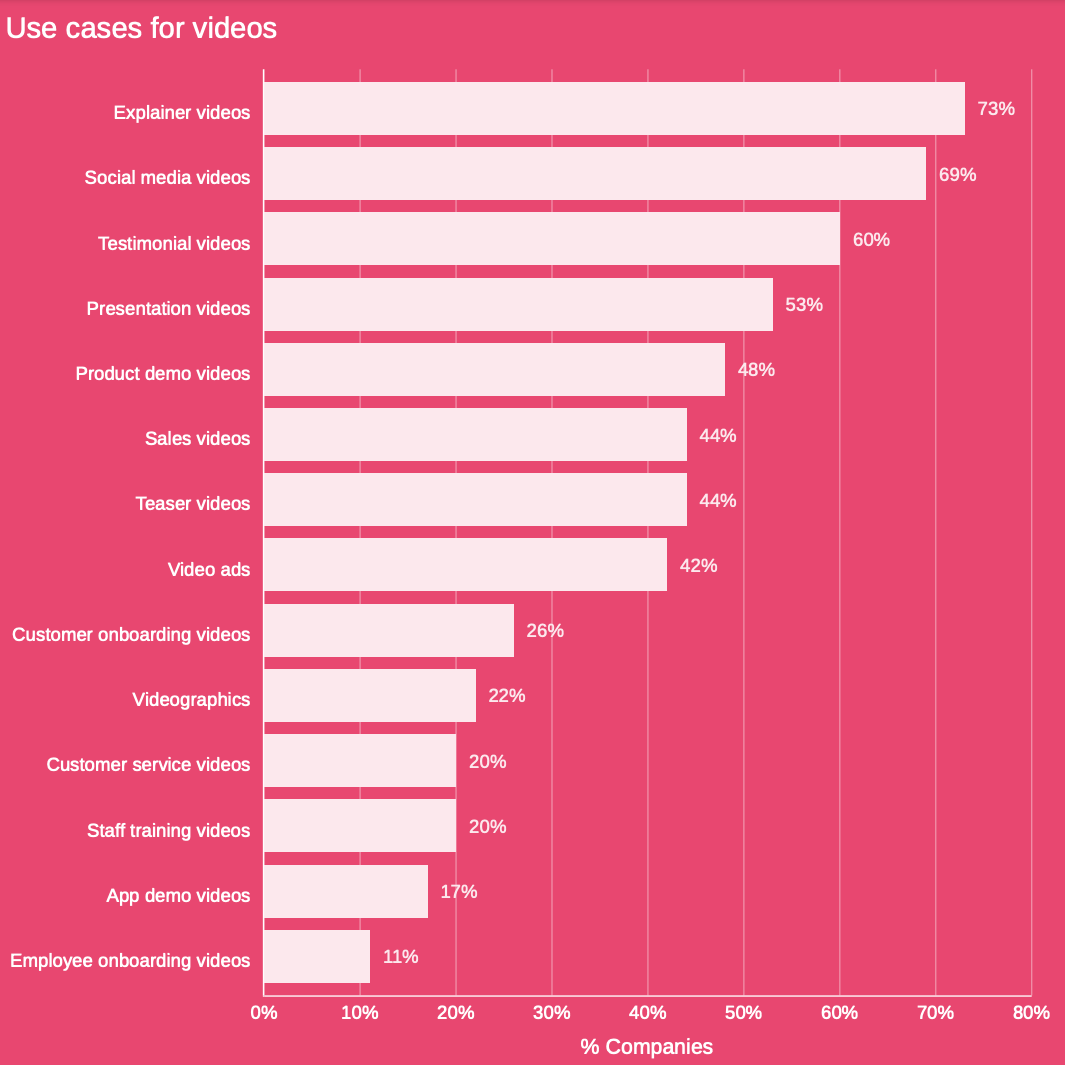
[Source: wyzowl.com]
AI in Content Marketing Statistics
A clear theme dominates the conversation among content marketers: how, when, and why to use AI. The data is stark — marketing teams that embrace AI will outperform those that don’t.
How to Create Genuine Native Content
Here’s how marketing leaders are using AI to boost efficiency, deliver personalized experiences, and drive better results across channels:
- 85%t of B2B marketers say they use generative AI tools.
- Around 42% of marketers report using artificial intelligence (AI) tools “a few times per week or daily.”
- The top three areas that marketers are using AI in content marketing include writing/content (42%), social media content/generation (40%), and personalization/recommendation (34%).
- One in two writers use AI tools to boost the performance of their content.
- According to research reported on HubSpot, “75% of marketers believe that AI-enabled search engines will positively impact their blogs, and 68% predict that their site will get more traffic.”
- 68% of marketing leaders report an ROI on their investment in AI.
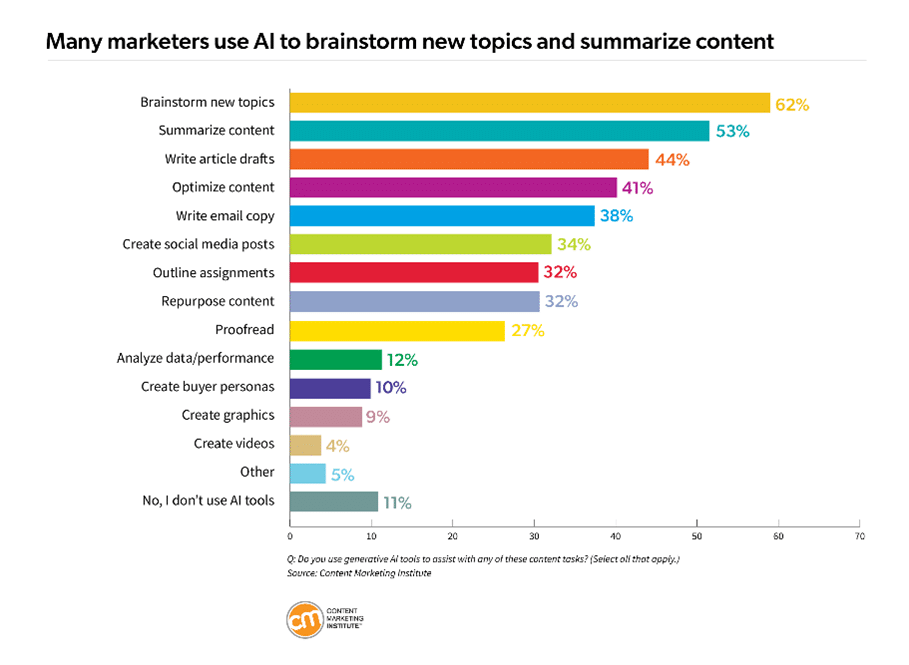
[Source: Content Marketing Institute (December 11, 2024)]
Content Marketing Growth Statistics
Does content marketing correlate directly with growth metrics? Absolutely, and these stats shine a light onto exactly how:
- 58% of B2B marketers report an increase in sales and revenue thanks to content marketing.
- Over 41% of marketers measure the success of their content marketing strategy through sales.
- 94% of marketers say personalization boosts sales.
- More than one in three marketing leaders cite conversion rates as a top KPI that they prioritize tracking.
Content Marketing Lead Generation Statistics
Content marketing is an excellent way to boost lead generation in a variety of ways. Some numbers around this are:
- Content marketing costs 62% less than outbound marketing and the leads are 6 times as likely to convert.
- 70% of marketers would rate their leads as being “high quality.”
- Quality and quantity of leads are both top priorities for B2B marketers.
- 76% of marketers say that their content marketing efforts helped generate demand and leads in the past 12 months.
Content Marketing Statistics by Channel
Each marketing channel offers unique opportunities for your strategy and goals. From SEO-optimized blogs to video content and email campaigns, knowing where to wisely invest is key. These channel-specific stats will help you refine your content strategy and choose the best distribution channels for your content.
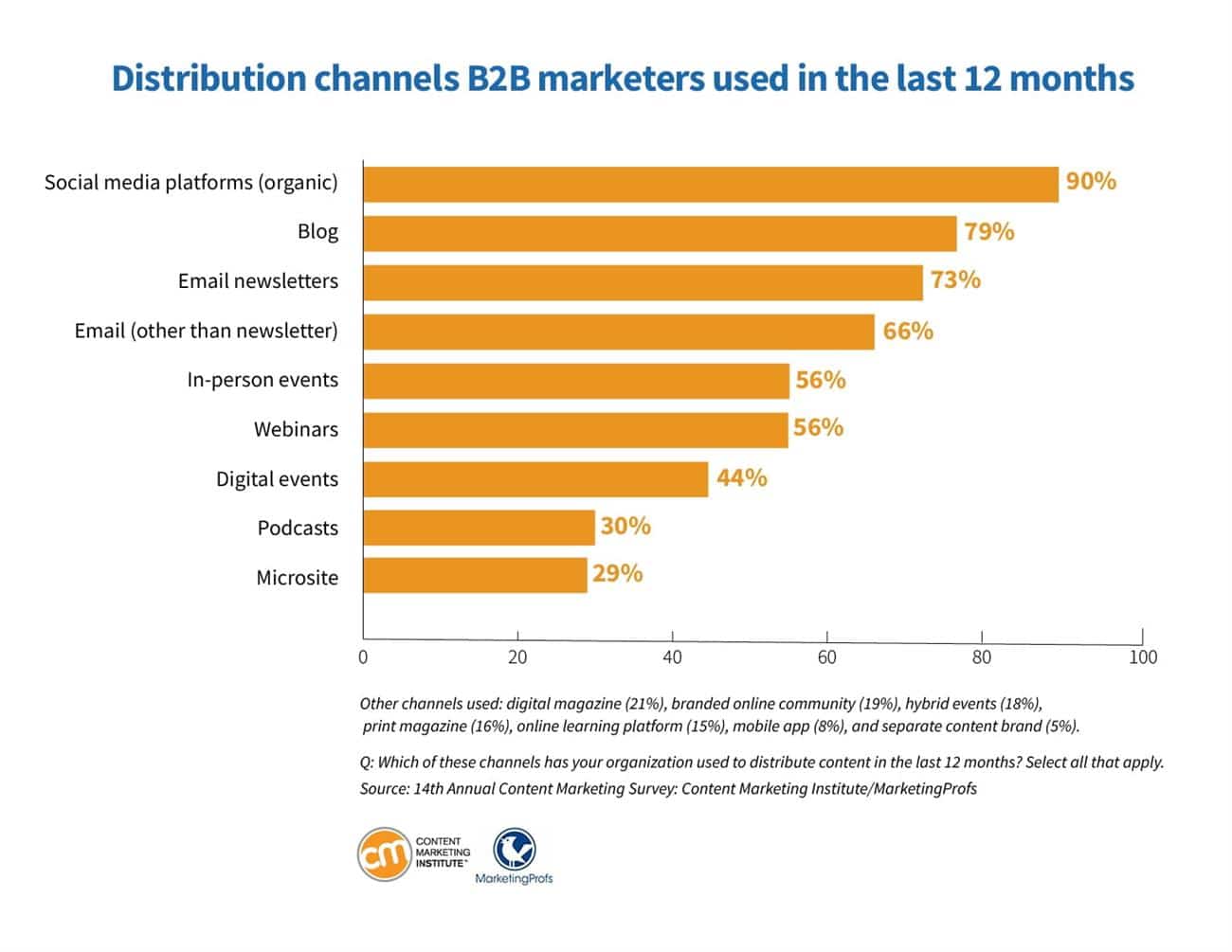
[Source: MarketingProfs.com]
Organic Search
- Fifty-three percent of bloggers say it’s gotten harder to attract visitors from search engines.
- 39% of marketers list optimizing on-page content based on keywords as their top SEO strategy
- 29% of marketers list SEO as a top trend they leverage.
- About 90% of people think voice search is easier and faster than traditional search.
- Optimizing for SEO is a top challenge for nearly half of B2B marketers.
Video Content Marketing Statistics
- 84% of businesses use video as a marketing tool, indicating that your competitors are likely using it.
- Videos are tied with case studies/customer stories (53%) as the type of content that produces the best results for B2B marketers.
Podcasting
- 29% of marketers incorporated audio content in their strategy in 2024.
- 30% cite podcasts as an effective channel for distribution.
Email marketing
- 66% of B2B marketers used email marketing in 2024 — and 73% used email newsletters.
- 44% of marketers say that email produced the best results as a distribution channel.
- 71% of marketers rely on email engagement as a key metric to evaluate content performance, second to conversions (73%).
Key Takeaways: How to Make the Most of Your Content Marketing Strategy in 2025
The numbers don’t lie — content marketing is one of the most effective tools at your disposal for driving growth, engagement, and ROI. Whether you’re leveraging video, blogs, or email marketing, the data shows that businesses with a well-documented content strategy see higher success rates.
Remember that effective content marketing doesn’t happen overnight. Do the research to determine which success metrics to track, how to get content marketing to ladder up to your bigger marketing goals, and how others in your field are already making great use of content marketing today.
Lastly, don’t shy away from emerging AI tools, which can enhance personalization, improve efficiency, and maximize your impact. Try to implement some of these tips to replicate the success of top marketers in 2024.
Frequently asked questions (FAQs)
What is the success rate of content marketing?
The specifics will vary widely, of course, depending on your strategy, product, and tactics. However, nearly 29% of marketers view the success of their content marketing efforts as extremely or very successful, according to Content Marketing Institute research. Meanwhile, more than half of marketers say their strategy is moderately successful.
What is the average ROI for content marketing?
Most marketers report a positive ROI for content marketing — and the results vary by channel. For example, for every $1 spent, email marketing generates $36 in ROI. Social media and email drive the highest ROI of all marketing channels, say 63% and 43% of marketers respectively.
What is the average budget for content marketing?
According to WebFX, the average business invests between a quarter and nearly a third of its marketing budget in content marketing. This will range depending on your revenue and marketing budget, but a good rule of thumb is to use 7% to 8% of your revenue for your total marketing budget. From there, you can break out content marketing as one line item in that budget.


